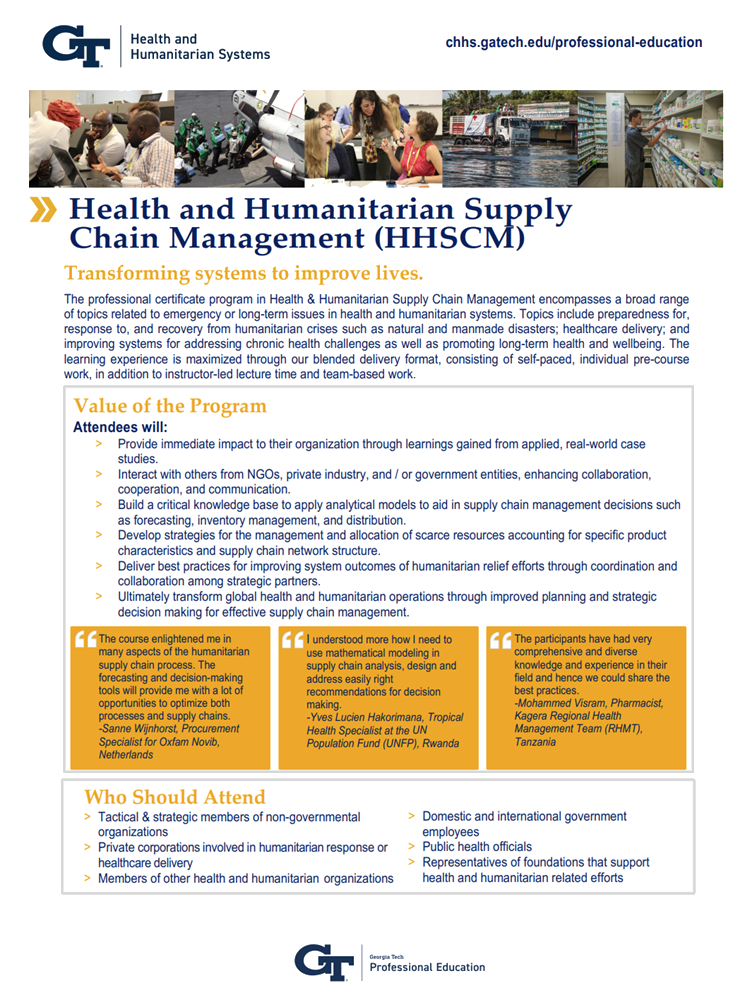The Health and Humanitarian Supply Chain Management (HHSCM) Certificate program offered through Georgia Tech Professional Education (GTPE) is designed for participants from NGOs, private industry, foundations, and/or government entities who seek to positively impact their organization and the constituents they serve. Courses are taught via live video instruction with interactive components similar to an in-person format, enabling a flexible pace wherever you are in the world. Interactive components include case studies, simulations, and games, which help professionals link the challenges and decision-making tradeoffs they face in everyday practice with the systematic approaches, tools, and techniques presented in the courses. Participants will learn the concepts and skills to improve the efficiency and effectiveness of their organizations for enhanced short- and long-term outcomes.
Each course can be taken individually or as a part of the three-course Health and Humanitarian Supply Chain Management Certificate program. By registering for the full three-course certificate program, you will receive $400 off of each course, or $1200 total. Once you have added all three courses to your cart, enter the coupon code SCL-HHS at checkout. Contact chhs@gatech.edu if you have questions.
Please note that all sessions will take place virtually. No travel is required; however, a strong internet connection is necessary to participate. The program will be conducted in English.
HHSCM Scholarship Applications
A limited number of scholarships are available due to the generous support of the UPS Foundation.
Health and Humanitarian Supply Chain Management (HHSCM) Course Series
Responsive Supply Chain Design and Operations
March 9-13, 2026
Course Description
Meeting demand in a timely and cost-effective manner is important both in public and private supply chains, and heavily depend on the design and operation of these supply chains. Demand is affected by ongoing factors such as local economy, infrastructure, and geographic location, as well as unexpected events such as natural or manmade disasters or other large-scale disruptions. Designing and operating responsive supply chains requires the consideration of uncertainty in timing, scope, scale, and understanding of various topics such as forecasting, distribution network design, and inventory management. This course will examine methods and models for making supply chain design and operational decisions and explore the significant value that is obtained through informed decision-making in advance of an unpredictable event or long-term strategy for meeting the need of customers and beneficiaries.
Inventory Management and Resource Allocation in Supply Chains
March 23-27, 2026
Course Description
Many supply chain decisions are concerned with the timely and efficient procurement, allocation, and distribution of resources (e.g. funds, supplies, volunteers, money, employees, etc.) through a supply chain network. This course will explore methodologies for “medium term” decision making, including procurement and inventory policies, strategies for distribution and allocation of limited resources, and supply chain design.
Systems Operations and Strategic Interactions in Supply Chains
March 30 - April 3, 2026
Course Description
Often the lack of cooperation and coordination between organizations or stakeholders lead to inefficiencies, despite having common goals. A systems view is needed to ensure appropriate use of scarce resources to meet the multiple, and often conflicting, short- and long-term goals from multiple constituents. This course will focus on conceptual and modeling skills to understand and effectively manage supply chains and operations from a systems perspective. Models will address system characteristics (e.g., demand dependencies) that drive system dynamics and policies to regulate performance. Course topics include methods for improving coordination and collaboration, addressing demand dependencies, and reliably measuring and evaluating system performance.
Please review the detailed HHSCM course series schedule/agenda. Please note:
- An HHSCM program Introduction and Excel Solver introduction will be held ahead of the courses in February and March.
- Preparation sessions for Courses 2 & 3 will be held the week of March 16th.
- Friday for each course is reserved for office hours (optional).
View the related informational webinar
Learn key lessons & strategies from recent health crises to strengthen supply chain resilience
Join us while we examine key lessons from recent health crises to help you strengthen supply chain resilience and responsiveness. We also explore strategies to improve preparedness for future large-scale public health emergencies.
Discover Stories Behind our Alumni
These profiles highlight professional journeys, industry insights, and personal reflections. Explore their backgrounds, current roles, and watch exclusive interviews to learn how their experiences shaped their careers.


